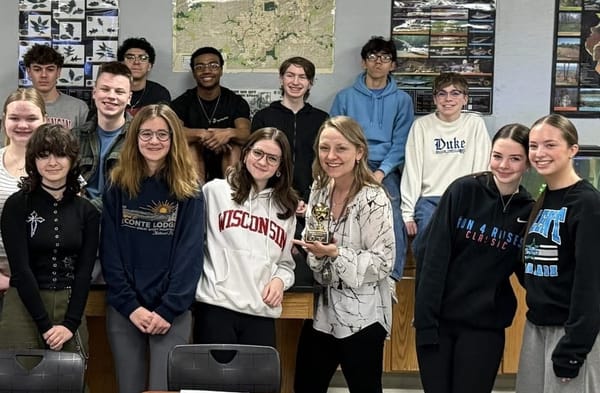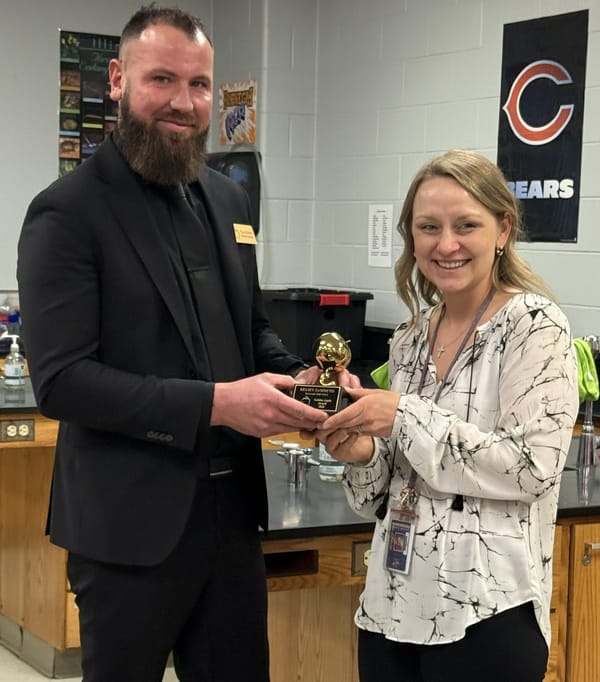Book fair controversy at Prairie Hill sparks community debate over book selection
Parents and administrators are discussing appropriate content, parental involvement, and student access to diverse books.

As Scholastic Book Fairs begin to appear across local elementary schools following the conclusion of Banned Books Week, a seemingly routine school book fair has ignited a wider debate about content appropriateness in South Beloit.
Prairie Hill School District (PHSD) finds itself at the center of a heated discussion between upholding students’ access to diverse stories and responding to parental concerns. What began last April as a dispute over a specific book offered at the Scholastic Book Fair has evolved into a community-wide conversation, echoing the national debate over censorship and inclusivity in children’s literature.
A father’s concern: The book that sparked it all
It was a regular spring afternoon when Michael Breeland’s fourth-grade daughter came home from Prairie Hill Elementary, excited about the books she had seen at the Scholastic Book Fair. However, her mention of a specific book, Stars in Their Eyes by Jessica Walton and ASKA, raised concerns for Breeland and his wife. The graphic novel follows two young teens navigating friendship and identity. It features a cover depicting two youths kissing.
“When my daughter brought up that book, I initially thought it might have slipped through the review process,” Breeland explained. “We trust the school to create an environment that is safe for young students, and this book didn’t align with what we consider suitable for elementary-aged children.”
For updates, subscribe to our free newsletter!
Prairie Hill administrators say that some parents have specifically asked them to make Stars in Their Eyes available for their child. And in their book fair policies, they say they are simply following HB2789, which took effect in January 2024. Supporters applaud the law, signed by Gov. JB Pritziker, for making Illinois the first state to "outlaw book bans" in libraries. Under the law, Illinois libraries can receive state-funded grants only if they adopt the American Library Association's Library Bill of Rights, which says reading materials should not be "proscribed or removed because of partisan or doctrinal disapproval." The public libraries in Rockton, South Beloit, and Roscoe have all subscribed to the Library Bill of Rights. In 2019, the American Library Association affirmed that it "opposes all attempts to restrict access to library services, materials, and facilities based on the age of library users."
The Breelands’ biggest concern was the book’s recommended reading age—12 and up, for grades 7-9—despite its availability at the elementary book fair, where it was accessible to children as young as four. Stars in Their Eyes is a young adult romance that touches on themes like bisexuality and nonbinary identity—content that the Breelands felt was not appropriate for young readers. “This isn’t about censorship,” Breeland says. “It’s about ensuring age-appropriate content is provided in places intended for young children.”
The incident was particularly jarring for Breeland because of his family’s previous positive experiences with the school. The Breelands had moved to the district in 2021, viewing the school’s Blue Ribbon status as a perk. Any issues they’d had in the past were promptly resolved. This time, however, they found themselves increasingly frustrated. When Breeland’s wife first emailed the librarian about the book, she received no response. A follow-up email eventually prompted a reply from the previous school administration, who defended the book’s presence, citing the wide array of titles available at the fair for different age groups.
Feeling dismissed, Breeland pushed further, suggesting compromises like segregating mature content or limiting access to such books to after-hours when a parent was present. “At the very least, these materials should be segregated for older students and adults to view and purchase,” Breeland said. “But none of our suggestions were considered.” This dismissal of their concerns ultimately led Breeland to escalate the issue to Superintendent Clint Czizeck and eventually to the school board.
Breeland denies that the safeguards Czizeck describes in our interview were in place at the book fair. He says he suggested these safeguards to them afterwards.
A meeting with district leaders
Rockton-Roscoe News sat down with Prairie Hill Superintendent Clint Czizeck and School Board President Josh Hendryx to discuss the current procedures and the controversy surrounding the book selection at the Scholastic Book Fair.
Rockton-Roscoe News: Can you describe the current content review process for books at the book fair? Should this process be improved to ensure that only age-appropriate materials are available for younger students?
Superintendent Clint Czizeck:
The Scholastic Book Fair is meant to offer a wide range of reading materials to appeal to students of varying ages and different reading abilities. While it’s held at the elementary school, students from older grades and their families also visit the book fair. It’s organized in a manner that separates content for specific age groups. For example, materials for younger readers are displayed separately from those meant for older or more mature audiences.
When students attend the book fair during the school day, their teachers or librarians direct them towards more age-appropriate books. If a student picks up a book that is above their grade or reading level, that book is placed in a holding basket, and the librarian encourages the student to return with their parents to review it together before making a purchase. If there’s any question at all, the librarian won’t let the student purchase that book until a parent has the chance to review it.
The state of Illinois has placed explicit prohibitions on banning or restricting access to books in libraries. While the book fair is technically different from a library, we apply that law in the same spirit to the book fair.
Rockton-Roscoe News: Are you satisfied with the current review process, or do you think there is room for improvement?
Superintendent Clint Czizeck:
I’m comfortable with the process we have in place right now. It provides a good balance of allowing students access to diverse books while also ensuring that younger readers are directed to materials that are suitable for their age group.
Rockton-Roscoe News: Is there a plan to involve parents more directly in the book selection process or provide advanced notice of the books available at the book fair?
Superintendent Clint Czizeck:
At this time, there isn’t a plan to involve parents more directly in selecting books. However, we do send out information about the book fair in advance. This includes a link to the Scholastic website where parents can preview all the books that will be available. We also send a principal letter and a flyer home to let parents know the book fair is coming up. The book fair features around 400 titles, so it’s really meant to serve as a community resource for books, not just for the students of the school where it’s held.
Board President Josh Hendryx:
I’d like to note that if a parent wants to place greater controls on their child’s participation in the book fair, they do have that option. We respect the individual opinions of parents, and we’re willing to work with them to address their concerns. It’s worth mentioning that, while the Breelands have expressed concerns about this particular book, I’ve also had other parents specifically request that it be available for their child. We’re striving to meet the needs of all our families as best we can.
Rockton-Roscoe News: When concerns like this arise in the future, how does the administration plan to address them promptly and effectively?
Superintendent Clint Czizeck:
When a concern is brought to us, we first address it at the building level. If that response doesn’t suffice, it moves to the district level, and if necessary, it then goes to the board level. That’s how we plan to continue addressing any issues that come up.
Board President Josh Hendryx:
We take pride in being prompt in our responses, but we also ensure that the information provided is accurate. If there is a concern, it’s important to take the necessary time to vet the information, consult with staff, and determine the best course of action.
Rockton-Roscoe News: How can the school improve communication and transparency with parents when it comes to content or sensitive issues like book selection?
Superintendent Clint Czizeck:
As a district, we communicate consistently with parents and the community, and I feel we do a good job in that regard. We encourage parents to reach out directly if they have concerns—whether it’s to their child’s teacher, an administrator, or the board. We’re open to listening, and we do our best to address concerns promptly.
Rockton-Roscoe News: Michael Breeland mentioned that he might have felt more comfortable about the book fair if there were signs indicating sections with more mature content. Is that something the district would consider?
Superintendent Clint Czizeck:
We do something similar within our library, such as using our Red Dot program to identify content that might require parental approval. I believe we may already be doing something similar for the book fair, but I’d have to double-check to confirm. We want students to have access to appropriate material, and any adjustments that make this clearer for parents are something we’d consider.
Rockton-Roscoe News: Could you explain the Red Dot program you mentioned? How does it work in your library?
Board President Josh Hendryx:
The Red Dot program has been in place for quite a while, even before I joined. Essentially, parents need to sign a permission slip that allows their students to check out or review any books that are part of the Red Dot program. These are books identified as potentially more mature, so we ensure that parents are involved in that decision.
Rockton-Roscoe News: Are there any other measures in place to guide students toward age-appropriate content at the book fair?
Superintendent Clint Czizeck:
During the book fair, students have the opportunity to preview the available books during school hours, and staff members are there to ensure they’re browsing material appropriate for their age level. Also, the library is locked when the librarian is not present during the book fair, so there is always adult supervision whenever the book fair is accessible.
Superintendent Clint Czizeck adds,
“We want nothing but the best for the kids in this community. That’s why we’re all here. We want what’s best for everybody’s child, educationally and personally—it’s a big family, and it has been for many, many years, and we want to continue that.”
Community divided
Michael Breeland’s dissatisfaction with the handling of the book fair controversy, along with his growing distrust of the school administration, ultimately led him to pull his children from the district and homeschool them. Despite withdrawing his children, Breeland has remained involved, attending the Prairie Hill School Board meetings, recording them, and posting them to his Facebook page as a resource for parents. “We’re not here to create conflict. We’re here to ensure that the students in the district have a safe, supportive environment,” Breeland said.
Breeland’s actions have sparked a wider conversation among the community, with both support and opposition coming to light. He created Parents of Prairie Hill School District 133, a Facebook group for parents to voice their concerns and share experiences. “After the emails stopped, I was feeling discouraged and angry,” Breeland explained. “I realized I needed to move forward, and that’s when I decided to start the group to bring more transparency.”
The group, now numbering 188 members, has seen several parents express similar frustrations over the lack of responsiveness and transparency from the administration. Breeland has provided a platform where parents can discuss their experiences and stay informed about school board decisions. The group’s anonymous posting feature aims to protect parents who fear backlash, although, Breeland mentioned, “Many parents are still hesitant to speak up, fearing repercussions from the administration.”
Community reluctance and lack of response
The topic of book selection at Scholastic school book fairs and dealing with parental concerns like Breeland’s has proven to be a sensitive issue, with many community members reluctant to share their stance publicly. Rockton-Roscoe News reached out to several area public libraries and elementary schools for comment on Scholastic Book Fairs’ book selection and their handling of parental concerns, but no one was willing to respond. The North Suburban Library replied by providing helpful information from the Illinois Library Association, the Association of American Publishers, and the American Library Association.
Expert perspectives on book selection
Education experts agree that better communication and structured processes could help alleviate some of these concerns.
Jethro Jones, a Transformative Principal in Spokane, Washington, and author of SchoolX highlighted the importance of involving parents early on:
“Part of the reason why parents are upset about sensitive subjects in school libraries and book fairs is because they feel like it’s being snuck in. Notifying parents ahead of time and partnering with them is a great way to diffuse the situation. Send them notes ahead of time saying there might be books they find questionable, and encouraging them to talk to their kids about why they aren’t appropriate for their family can ease the tension. Parents need to feel like schools are on their side, not undermining their parenting at every turn. Open proactive communication helps with that. Ultimately, it’s about getting our kids to read and find joy in that reading.”
Stefano Lodola, a course author and former teacher, suggested a structured approach:
“Schools should implement a structured vetting process for book selection, ensuring age-appropriateness by considering content, language, themes, and illustrations. This involves consulting developmental psychology frameworks and guidelines from organizations like the American Library Association, with diverse committees of educators, librarians, and child development experts contributing varied perspectives. Inclusivity should be prioritized, choosing books that represent diverse racial, ethnic, cultural, and family backgrounds, and introducing topics like disability and gender identity in relatable ways to promote empathy and understanding.
The Scholastic controversy
The debate in Prairie Hill mirrors a controversy Scholastic faced nationwide. In October 2023, Scholastic introduced the “Share Every Story, Celebrate Every Voice” collection—approximately 60 books focusing on themes such as LGBTQ+ rights, racial justice, and diverse identities.
Initially, this collection was presented as an optional add-on for schools, meant to help educators navigate restrictive state laws around content. However, after significant backlash from educators, parents, and authors who felt the separation implied that these stories were less important, Scholastic decided to integrate the collection fully.
According to a story by Aimee Picchi of CBS News, Scholastic defended its original decision to offer the collection separately, stating, “We cannot make a decision for our school partners around what risks they are willing to take, based on the state and local laws that apply to their district, so these topics and this collection have been part of many planning calls that happen in advance of shipping a fair.” The company added, “We have invited guests in schools, and we took that into account when making this decision.”
The controversy highlighted the challenges of ensuring that books representing diverse communities reach children despite restrictive environments. Scholastic’s response to the backlash and subsequent integration of the collection is being closely watched by other publishers and educators grappling with similar issues.
SkyTree offers a different approach
In response to growing dissatisfaction with Scholastic, alternative book fair providers, including SkyTree Book Fairs, have begun emerging. In a 2023 Axios Richmond article, actor and evangelist Kirk Cameron, a board member of SkyTree and a vocal advocate for the new book fair, described it as a “wholesome literature” alternative to Scholastic. Spotsylvania, Virginia, recently adopted SkyTree as its school book fair provider, and Cameron says, “The superintendent of the district is so excited about this. They have gotten rid of Scholastic; they’re putting in SkyTree Book Fairs.”
SkyTree, a Texas-based initiative, promotes itself as an alternative to Scholastic that does not include “sexually explicit content aimed at young kids,” per its website. The company remains in the early stages of building its collection, with limited information regarding the specific titles it will offer at book fairs. However, it has positioned itself as a more conservative-friendly option for schools seeking to avoid content that some communities may find controversial.
Moving forward: Collaboration for the best environment
The Prairie Hill controversy has brought to light an issue that extends beyond a single school district—how do educators balance accessibility, inclusivity, and age-appropriateness when it comes to the reading material available to children?
During our meeting, Superintendent Clint Czizeck discussed the district’s desire to learn and improve through community feedback:
“We’re always looking to improve. If the community has feedback for us, we’re open to listening and making ourselves better. We want what’s best for every child in this district.”
Board President Josh Hendryx echoed this sentiment, stressing that the district respects parental opinions:
“We respect the perspectives of all parents. If there are frustrations, we want to address them. We want our community to be proud of being part of Prairie Hill, and we are committed to enhancing communication to achieve that.”
Finding common ground
While the issue of book selection at Prairie Hill remains a complex topic, both sides agree on one fundamental principle: parents should play an active role in determining what their children are exposed to. Whether advocating for greater access to diverse literature or seeking to ensure young readers are protected from content deemed inappropriate, the shared belief in the importance of parental involvement may serve as a foundation for more constructive dialogue in the future.





